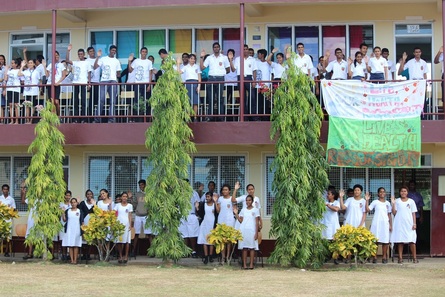Every year, more than 4000 people in Fiji die prematurely due to Diabetes related commodities, hypertension, and heart diseases. Diabetes is fast becoming the number 1 killer in Fiji. Thousands more acquire no-communicable disease every year without even knowing about it.
Thousands of families lose a breadwinner, parent, or child to non-communicable diseases prematurely, throwing the whole family in a cycle of suffering and even poverty. The disease burden is crippling the country.
The Need for Public Health Intervention
The state of Non-Communicable Diseases (NCDs) in Fiji has been declared as a National Crisis by the Ministry of health. NCDS cause premature deaths and disabilities, huge social cost and economic burden on the nation and is the single most pressing health issue in Fiji.
Key facts1
The biggest challenge amongst the people is the lack of knowledge pertaining to nutrition and wellness.
Due to the strong reputation of ACATA Trust Fiji, we have been able to instigate behaviour change in thousands of people and continue to transform health behaviours in Fiji, every day through innovative & evolving projects. You will be given full training and guidance during the program, while being able to utilize your own skills & knowledge.
Our solution based programs are practical and can be replicated in multiple communities.
Thousands of families lose a breadwinner, parent, or child to non-communicable diseases prematurely, throwing the whole family in a cycle of suffering and even poverty. The disease burden is crippling the country.
The Need for Public Health Intervention
The state of Non-Communicable Diseases (NCDs) in Fiji has been declared as a National Crisis by the Ministry of health. NCDS cause premature deaths and disabilities, huge social cost and economic burden on the nation and is the single most pressing health issue in Fiji.
Key facts1
- 50% of the adult population in Fiji are projected to be Diabetic within the next 5 years
- Diabetes related comorbidities is fast becoming the number 1 killer in Fiji
- NCDs kill more than 4000 people in Fiji each year, giving an average of around 11 deaths per day.
- More than 82 % of all deaths attributed to NCDs occur before the age of 60
- Cardiovascular diseases account for most NCD deaths in Fiji
- Associated risk factors are unhealthy diets, tobacco use, physical inactivity, the harmful use of alcohol and unhealthy diets.
- National risk figures
- 15% of Fiji’s population exercise
- 30 % consume alcohol
- 17 % smoke cigarettes
- Poor Dietary patterns contributes to the NCD disease burden more than any other risk factor.
- Only 15% of our population live beyond the age of 55
- Approximately, only 8% of the elderly population live beyond the age of 60
- Over the next 10 years the cost or the disease burden of diabetes, heart disease, and stroke will take a tremendous toll on the national income of Fiji
The biggest challenge amongst the people is the lack of knowledge pertaining to nutrition and wellness.
Due to the strong reputation of ACATA Trust Fiji, we have been able to instigate behaviour change in thousands of people and continue to transform health behaviours in Fiji, every day through innovative & evolving projects. You will be given full training and guidance during the program, while being able to utilize your own skills & knowledge.
Our solution based programs are practical and can be replicated in multiple communities.
1,000 Students at Nadi Sangam College take a pledge to reduce the consumption of simple carbohydrates under the ACATA School Health & Wellness Policy
Reduce Disability
Fiji Has an average of 2 amputations per day due to complications arising from Diabetes . The socioeconomic cost of the disease burden is crippling the whole society,
|
Stay at Home Parent Education
We need volunteers to educate mothers staying at home on how to make better food choices and how food affects the family health
|
Research
Our programs provide the platform to conduct interesting health attitude and behavior surveys to get a better understanding on how to tackle socioeconomic causes and other determinants of health
|

